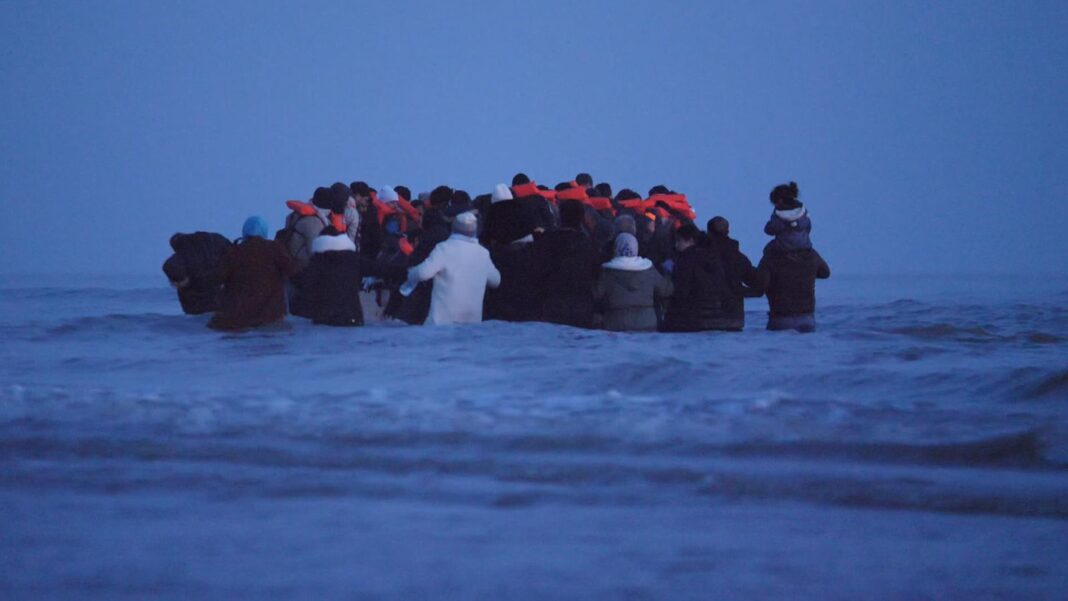We are rushing down the beach. In the gloom just before dawn, people are waiting by the seashore, a few hundred metres away.
We can see a dinghy out at sea. And then a voice rings out, in Kurdish.
“Whose passengers are you?”
In the half-light, the people smuggler thinks we are customers here to clamber onto the boat, and wants to know who we had paid.
We tell him we’re journalists.
“Keep out of the way,” he warns.
There are several dozen people gathered together, standing on the shoreline, moving anxiously from side to side.
Migrants wait for a dinghy as they prepare to cross the Channel to reach the UK
I can see some women and children, but most of the passengers are men.
Some are clinging to a bag of possessions; others have nothing but the clothes they stand in. A man has his child held up on his shoulders.
Just about everyone is wearing a life jacket.
Just beyond, the boat is coming near the shore, already half full of people.
It seems impossible that all the people on the land can really fit into the space left in the boat, but that’s what happens.
On a signal, the movement starts – the younger men clamber in first, and then help the women, children and older people to get into the boat.
It all happens remarkably quickly. From a distance, migrant boats may look ramshackle and chaotic, but when you get up close, there is method and practice.
Some people jump off; the men who didn’t have life jackets on.
It becomes clear that these are the smugglers – or, more accurately, the smugglers’ assistants who have been sent to sort things out.
On one side, we see a moment of tension as two passengers square up – one accuses the other of not leaving a space for him to get aboard.
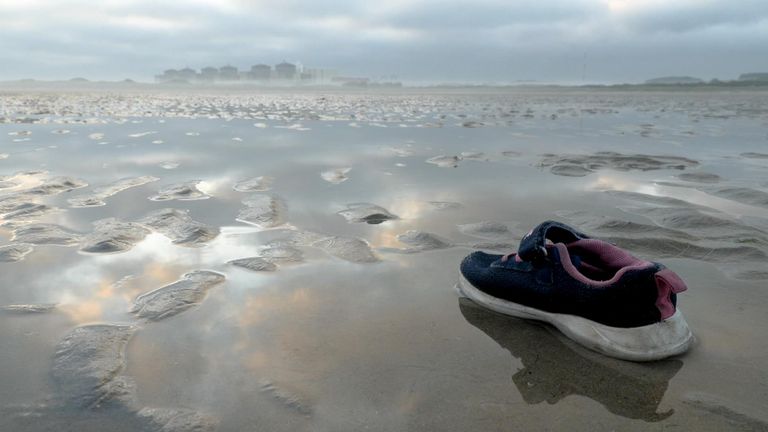
A shoe left in the sand following the attempted crossing
It is a faintly ridiculous squabble, like something between two drunk men in a pub, and it blows over. They end up sitting next to each other, brooding.
And then the engine is started and the boat sets off. At first, it’s a failure – the boat, low in the water with around 70 people on board, gets stuck on a small bar of sand and spins around.
But, with a push here and there, it gets going and slowly chugs away into the mist of the morning.
‘Migrants are desperate’
We turn around. The smugglers are leaving. We shout a question – are all these people Kurds?
“All of them,” he says. “These are the last Kurdish customers I have. There are no more.”
“Why not?”
And his answer is one succinct word: “Rwanda.”
The smugglers, dressed in black, disappear into the gloom.
We can just about see them clambering into the dunes, and then they are gone. It is a good ten minutes before we see the police – four officers marching down the beach.
They ask only two questions – firstly, did we see women and children on the boat (yes) and secondly, had the boat been launched from the beach (no).

Keep up with all the latest news from the UK and around the world by following Sky News
They’d only just started their patrol, one of the officers tells me. He looks at the calm waters and shrugs. It could be busy.
Over the course of that night, we had seen plenty of police officers. We’d been questioned on the beach, checked as we walked near the beach and then pulled over at a road block.
We’d chatted with a team of CRS riot officers on the beach, one of whom bemoaned the fact that so few people grasped the sheer complexity of what they took on.
“It is so, so complicated – the migrants are desperate, and they can get everywhere. We cannot have a team in every place, at every time.”
It turned out that the road block officers were exactly the same team who we’d met on a different beach the previous evening.
“Ah, Sky News you are back,” he said, with a smile and a handshake.
‘I cannot go to Rwanda’
We meet two young Sudanese men who tell us they are determined to get to Britain. When I ask if they’re worried about the Rwanda plan, they look blank. They’ve never heard of it.
And then we drop into a migrant camp that is growing in size and bump into another group of Kurds.
They are cooking food – this is the cafe for the migrants – and brewing tea that is strong, and scented with cinnamon.
They give me a cup. It’s delicious.
Omar is kneading dough, making crispy flatbread, and serving it with yoghurt. And he talks as he cooks, serving a remarkable story.
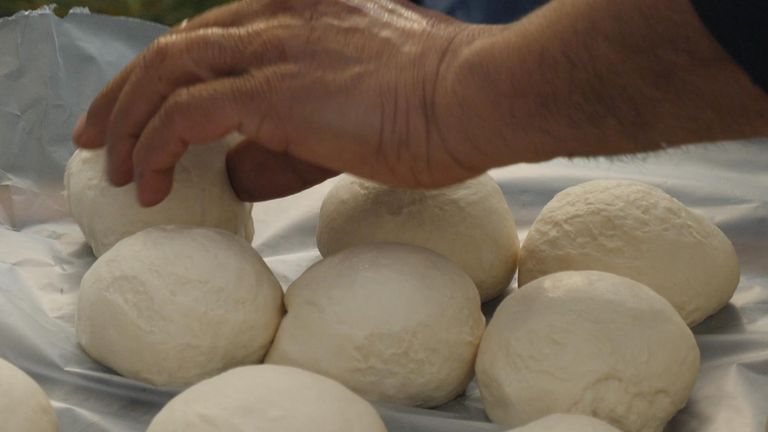
At a migrant camp in France that is growing in size, people kneed bread
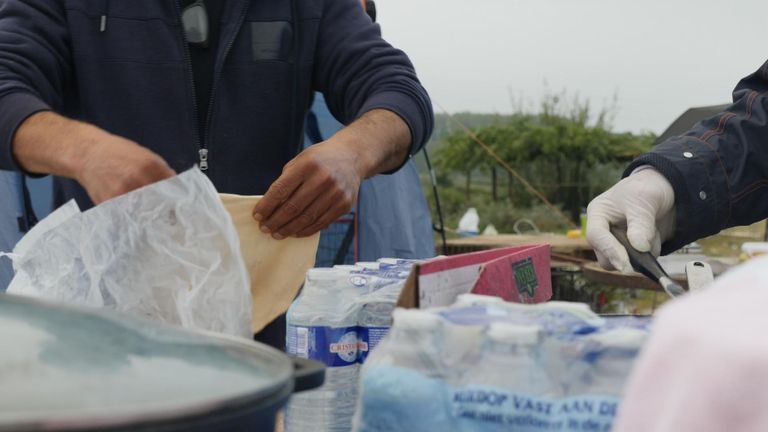
Two years ago, Omar left Kurdistan and paid a smuggler $15,000 (£12,000) to get him to Britain. He was there for 20 months, suffered a stroke, failed to gain asylum and ended up paying a smuggler £500 to get him out of Britain and back to this squalid camp in France.
Yes, you read that correctly. He paid to be smuggled out of Britain, and back to France.
“Here there is no washing or bath,” he says.
“You can’t clean yourself. Life is hard. But in Britain I had to give my fingerprints and signature regularly. Once every two weeks.
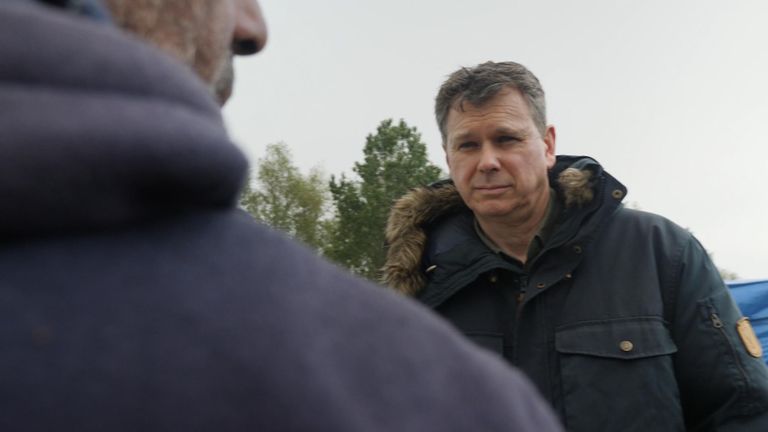
Omar, who paid to be smuggled out of the UK after a failed asylum claim, speaks to Adam Parsons
“Then I was told they had turned me down for asylum. I couldn’t cope with Britain any more.
“They could arrest me and send me to Rwanda or Iraq. Rwanda – I cannot go there.
“So that’s why I came back here, to this place. But I have no money. I am 52 years old. It’s a terrible feeling to be back here, but what can I do?”
Listening to him is Barzan, who arrived in the camp five days ago after eight months on the road since leaving Kurdistan.
Read more from Sky News:
Girl crushed to death on cross-Channel migrant boat
Rival group pushed their way on to cross-Channel boat
By striking contrast, he is not remotely bothered by the Rwanda plan.
“People won’t stop, whatever you tell them.
“Even if you tell them they will be taken to Africa, they would still go without hesitation. Rwanda is better than Kurdistan.
“But in Britain there is work. The currency is strong. I’m young and I want to make a life for myself.”
Another voice is raised – a man named Karwan.
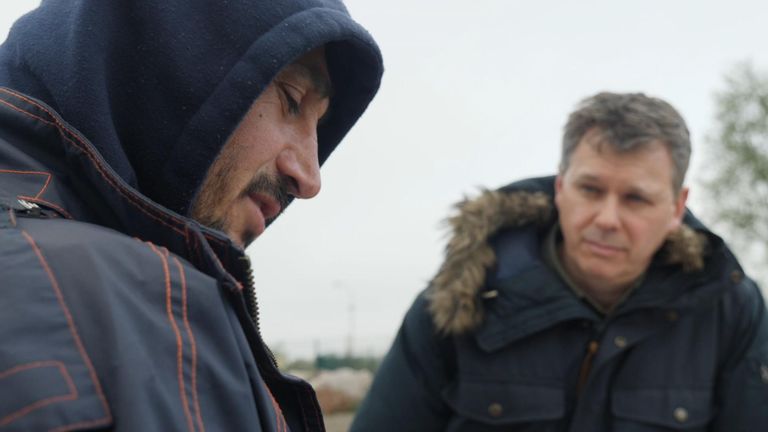
A man named Karwan, who wants to cross the Channel from France to the UK
He hears the word Rwanda, shrugs, smiles and shakes his head: “I think it’s a joke. Two years ago they started going on about Rwanda and nothing came of it.
“Now, it’s just for the sake of the election. Nothing else.”


